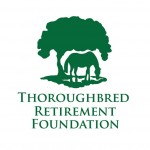
Code Forty, a foster horse from the Thoroughbred Retirement Foundation, works as a therapy horse with Suzanne Carter.
A bay mare who bucks when she’s ridden and has an addiction to windsucking—an act thought to get horses high— has brought hope and healing to therapy patients who seek her guidance in their journey toward wellness.
Code Forty, an off-track Thoroughbred fostered seven years ago from the Thoroughbred Retirement Foundation (TRF) has hit her stride, not as a sport horse or companion animal, but as a bona-fide therapist’s “assistant” at Unity Wholeness Center in Denver, Colo.
“Horses are relationship masters,” says Suzanne Carter, a licensed professional counselor, and proprietor of the Colorado center. “Because they’re prey animals, they’re motivated to be connected to their herd. And because of this, they have an amazing ability to know who’s safe and who’s not. They’re very tuned in to nonverbal cues, and I tell my patients they’re like a thousand-pound mirror.”
Code Forty
Barn name: Harmony
Sire: Boon’s Mill
Dam: Landmark Decision, by Fifth Marine
Foal date: April 24, 1999After welcoming Code Forty into her life and practice, she renamed the horse Harmony to better reflect the mare’s innate ability with people. And together, the pair has helped approximately 300 patients over the years.
Working in sessions ranging from one to two hours, people face their fears, their addictions, and past traumas while working with Code 40 in a controlled setting. Motivated by internal goals to face a range of troubling issues affecting their lives, patients report that the little OTTB has helped them access feelings, thoughts and intuitions that were otherwise inaccessible, she says.
“I was working with a man recovering from drugs. And he went to get Harmony, but she was over by a fence cribbing, or wind-sucking. Her face was contorted and she actually looked ugly,” Carter says, noting that the horse’s addiction reflected symmetry with the patient’s own drug habit.

Code Forty enjoys some “me time” with a furry friend.
Seeing a horse with addiction inspired the patient to discuss the animal’s situation, and in doing, finding words that could in some ways describe his own, she says.
Patients when seeking to relate to the horse, and to verbalize what they’re experiencing, often choose words that reflect their deeper experiences in life. “In dealing with horses they discover a new way of dealing with their own issues,” she notes.
Carter adopted Harmony seven years ago after becoming certified in equine-assisted therapy. At age 53, the longtime therapist awakened to her own desire to have a horse in her life. Which was a surprise, she says, noting up until then, she’d never even thought about horses or horse ownership.
Shortly after deciding to incorporate horses into her life and practice, she began searching the Thoroughbred Retirement Foundation’s website. Almost immediately she was drawn to Harmony.
“I don’t know what it was, but my eye just kept touching her photo. There was something indescribable about her,” she says. And since shipping the mare from Kentucky to Colorado, not a day has gone by when she hasn’t been delighted with her equine friend and partner.
“Horses are relationship masters,” she says. “They help people learn to reconnect with themselves … and I think, for me, the horse’s true purpose is to help humans.”


I consider my Arab, Summer, to be my therapy horse. He has taught me to slow down and use patience. That is what gets results! Harmony and Suzanne have a good thing going.